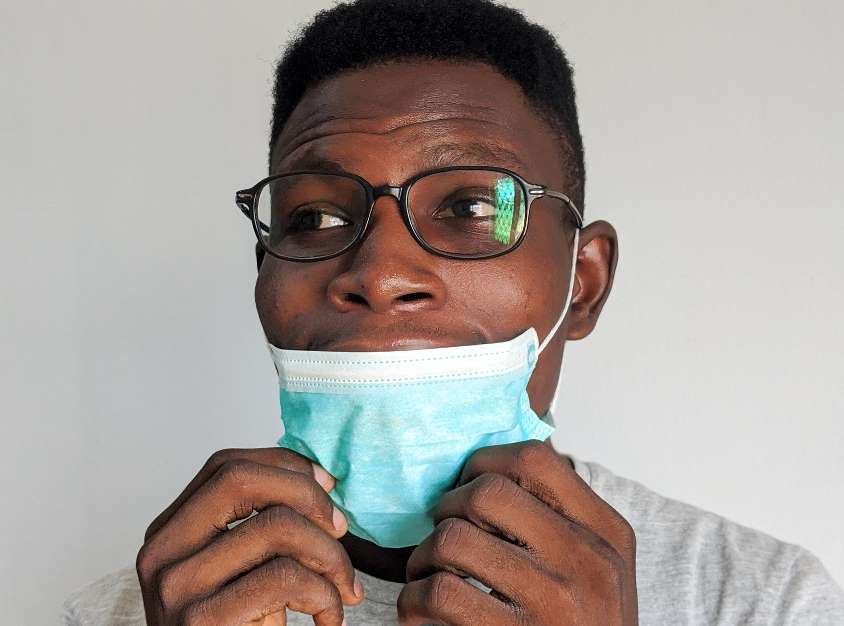Black Men Fear Wearing a Mask More than Getting COVID-19
United Church of Christ – Wider Church Ministries
Humanitarian Development Team
Coronavirus (COVID-19) Daily Briefing
Barbara T. Baylor, MPH – Temporary Health Liaison
Black men fear wearing a mask more than getting COVID-19
When the Centers for Disease Control (CDC) issued guidelines in early March asking people to wear masks to prevent the spread of the novel coronavirus, the question for many Black men was not where to get a mask or which kind.
It was: How do I cover my face and not get shot?
Being killed by police is one of the leading causes of death for young Black men. A study last year found one in a thousand Black men in America could expect to be killed by police during their lifetime. The recent killing of George Floyd increased and reinforced the widespread fear of violent death at the hands of law enforcement.
Despite their fears of infection, and statistics showing Black communities are among the hardest hit in the COVID-19 pandemic, many Black men feel wearing a mask is a bigger threat than the virus. They are more likely than white people to be stopped and frisked, to be pulled over for traffic violations, to be charged with drug crimes or to be stopped just because they “look suspicious.” For these reasons and more, many Black men are choosing not to wear masks at all.
Vickie Mays, Professor of Health Policy and Management at UCLA’s Fielding School of Public Health, studies health disparities. She has been tracking incidents where Black men wearing masks were harassed. Mays reports that African Americans have been dragged out of stores and ordered by police and store guards to pull their masks down or take their masks off. It appears that in some cases law enforcement makes a quick judgment that Black men are not protecting themselves and others around them from the virus, but they are “up to something.”
For example, Kam Buckner, a 35-year-old Black man, attorney and state senator from Illinois recently was targeted while shopping at his local hardware store in Chicago’s South Loop while wearing a face mask, as mandated by an executive order in Illinois. While many white customers streamed by wearing masks, a uniformed officer stopped him as he was leaving the store with a cart, asking to see his receipt and ID. When he asked why, the office replied, “I can’t see your face. You look like you might have been up to something.”
Another poignant story at the intersection of health and race is from a Black physician in Boston. Gabriel Felix says he has had to make decisions that limit how often he goes out after dark, knowing that some people will see a masked Black man as a threat. “Wearing a face mask helps protect me against COVID-19, but not against racism,” he says.
State Senator Buckner laments that the issue around masks and possible racial violence heightens the anxiety that Black people feel about the coronavirus. He says that none of the issues the Black community is facing because of the virus can be separated from the police violence many Americans are now protesting despite the risk of infection.
Mays says that people are protesting during this pandemic because they feel strongly that what is happening to them is worse than the risk of death from COVID-19. “Which death do they choose? COVID-19 or police shooting?”
She says leaders need to acknowledge that the targeting of Black men wearing masks clearly stems from racism. She advises Black men to wear masks, but, sadly, suggests they not be dark colors or “ominous looking,” but perhaps made from bright colors or traditional African prints.
Such incidents spurred six U.S. senators, including Kamala Harris (D-Calif.) and Cory Booker (D-N.J.), to send a letter asking the Department of Justice and the FBI to provide bias training to law enforcement officers during the pandemic.
While we understand that racial and ethnic groups are disproportionately affected by the virus and we understand the role and importance of wearing masks, it is disheartening to be reminded of the historic systemic racism that continues to permeate our society today.
Many people of color, and especially Black men, have the double fear of being exposed to COVID-19 and of suffering racial profiling by police officers or other citizens assuming the worst. This may cause undue stress, loss of sleep, anxieties and mental anguish – thoughts and feelings that white men may have less of or perhaps not at all. .
COVID-19 serves as another reminder of how deeply rooted structural racism is in our society and how a title – or a mask – can do little to protect Black and brown people from it. The mask order isn’t the issue here. Racism is.
Other References:
For some Black Americans, anxiety about wearing face covers in public may keep them from doing so.
Miami police investigating detainment of doctor who gives homeless virus tests, chief says
Related News
Growing Weary
In December 1964 during a speech in Harlem, Fannie Lou Hamer declared: “And you can always...
Read MorePlanning for Earth Month: Resources for Congregations
April is Earth Month, and for congregations, it can be a great time to further discern how...
Read MoreBodily Autonomy Means Every-BODY
Advocacy and Action for Women's and Gender Justice Local events stir thoughts and...
Read More


